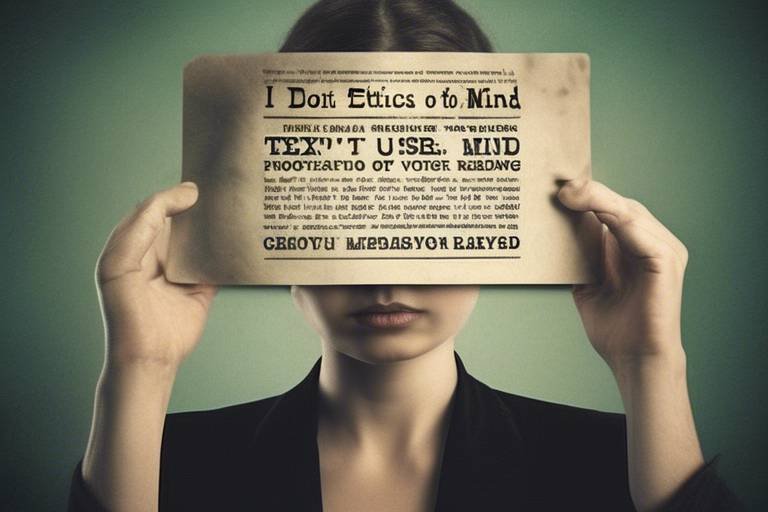An Analysis of Ethics in the Pharmaceutical Industry
The pharmaceutical industry plays a crucial role in enhancing public health and improving the quality of life through innovative medications. However, this industry is often under scrutiny for its ethical practices. The ethical challenges faced by pharmaceutical companies are not just about following regulations; they impact the very essence of trust between the public and the healthcare system. In this article, we will explore the intricate web of ethical considerations that shape the pharmaceutical landscape, examining how these issues affect drug development, marketing practices, pricing strategies, and ultimately, patient access to medications.
Understanding the importance of ethics in drug development is crucial. Pharmaceutical research is not merely a scientific endeavor; it's a complex interplay of morality, responsibility, and the quest for knowledge. Ethical considerations shape research practices in several ways:
- Patient Safety: The primary focus of any drug development process should be the safety and well-being of patients. Ethical guidelines ensure that researchers prioritize this over profit.
- Informed Consent: Participants in clinical trials must be fully informed about the risks and benefits of the study. This is not just a legal requirement but a moral obligation.
- Scientific Integrity: Ethical research practices promote transparency and honesty, ensuring that the data collected is accurate and reliable.
When pharmaceutical companies adhere to these ethical principles, they not only enhance the safety and efficacy of medications but also build a foundation of trust with the public. This trust is essential, as it encourages patients to participate in clinical trials and adhere to prescribed treatments, ultimately leading to better health outcomes.
In order to navigate the complex ethical landscape, various regulatory bodies oversee pharmaceutical practices. These organizations are responsible for enforcing ethical standards that ensure public safety and accountability in drug production. For instance, the Food and Drug Administration (FDA) in the United States plays a pivotal role in regulating the approval and marketing of new drugs. The ethical standards enforced by such bodies include:
- Rigorous Testing: Before any drug can reach the market, it must undergo extensive testing to demonstrate its safety and efficacy.
- Monitoring Post-Market Safety: Even after approval, drugs are continuously monitored for adverse effects, ensuring that any potential risks are promptly addressed.
- Transparency in Reporting: Companies are required to disclose clinical trial results, allowing for independent evaluation of their findings.
These regulatory frameworks are essential in maintaining ethical standards within the pharmaceutical industry. However, challenges remain, particularly in ensuring compliance and addressing the potential conflicts of interest that may arise.
The ethical implications of clinical trials are significant and cannot be overstated. Informed consent is a cornerstone of ethical research practices, ensuring that participants are fully aware of what they are signing up for. Pharmaceutical companies have a responsibility to provide clear and comprehensive information about:
- The purpose of the trial
- Potential risks and benefits
- Alternatives to participation
Without informed consent, the integrity of clinical trials is compromised. Participants must feel empowered to make decisions about their involvement, and this necessitates a transparent dialogue between researchers and participants.
One of the most pressing ethical dilemmas in the pharmaceutical industry is the targeting of vulnerable populations in clinical trials. These groups often include children, the elderly, and individuals with low socioeconomic status. While their inclusion is essential for ensuring that medications are effective across diverse demographics, it raises serious ethical concerns:
- Exploitation: There is a risk that vulnerable populations may be exploited, as they might not fully understand the implications of their participation.
- Equity: Ensuring fairness in how these populations are treated during trials is paramount. Special protections are needed to safeguard their rights and well-being.
Addressing these ethical dilemmas is crucial for fostering a just and equitable research environment.
Transparency in clinical trial results is not just a regulatory requirement; it is an ethical obligation. When pharmaceutical companies disclose their findings, they contribute to a culture of accountability and trust. This transparency affects public trust in several ways:
- It allows healthcare providers to make informed decisions based on comprehensive data.
- It empowers patients to understand the medications they are prescribed, fostering a sense of agency over their health.
- It encourages ongoing dialogue between the industry and the public, which is essential for improving healthcare outcomes.
Marketing strategies in the pharmaceutical industry can raise ethical questions. While promoting products is essential for business, companies must strike a balance between effective marketing and ensuring truthful representation of their products. Misleading advertisements can lead to:
- Patient Misinformation: Patients may be led to believe that a drug is more effective than it is, which can have serious health implications.
- Increased Healthcare Costs: Aggressive marketing can drive up prices, making medications less accessible to those who need them most.
Ultimately, ethical marketing practices are vital for maintaining the integrity of the pharmaceutical industry and ensuring that patients receive accurate information about their treatment options.
The pricing strategies of pharmaceutical companies can lead to ethical debates regarding access to essential medications. High drug prices can create barriers for patients, particularly those in low-income communities. This section examines the implications of high drug prices on public health:
- Affordability: When medications are priced out of reach, patients may forgo necessary treatments, leading to worse health outcomes.
- Healthcare Inequality: Disparities in access to medications can exacerbate existing health inequalities, particularly in marginalized communities.
Addressing these pricing challenges is essential for ensuring that all individuals have access to the medications they need to live healthy lives.
This subsection addresses how ethical considerations in pricing affect global health disparities, highlighting the challenges faced by low-income countries in accessing life-saving medications. The ethical obligation of pharmaceutical companies extends beyond their home markets; they must consider the global implications of their pricing strategies. Many countries struggle to afford essential medications, leading to:
- Increased Morbidity: Without access to necessary treatments, populations face higher rates of disease and mortality.
- Economic Burden: Poor health outcomes can strain healthcare systems and economies, perpetuating a cycle of poverty and illness.
To combat these disparities, pharmaceutical companies should adopt ethical pricing models that consider the economic realities of low-income countries.
The ethics of patenting pharmaceuticals is a contentious issue. On one hand, patents incentivize innovation by allowing companies to recoup their research and development costs. On the other hand, they can restrict access to essential medications for patients who cannot afford them. The challenge lies in finding a balance between:
- Encouraging Innovation: Patents provide a financial incentive for companies to invest in new drug development.
- Ensuring Access: At the same time, it is crucial to ensure that patients have access to affordable medications.
Innovative solutions, such as tiered pricing and patent pooling, may offer pathways to reconcile these competing interests.
Q1: Why is ethics important in the pharmaceutical industry?
Ethics is critical in the pharmaceutical industry because it ensures the safety and efficacy of medications, fosters public trust, and promotes fair practices in drug development and marketing.
Q2: How do regulatory bodies enforce ethical standards?
Regulatory bodies, such as the FDA, enforce ethical standards by requiring rigorous testing, monitoring post-market safety, and ensuring transparency in clinical trial reporting.
Q3: What are the ethical concerns regarding clinical trials?
Ethical concerns in clinical trials include informed consent, the potential exploitation of vulnerable populations, and the need for transparency in reporting results.
Q4: How do pharmaceutical prices affect access to medications?
High pharmaceutical prices can create barriers to access, preventing patients from obtaining essential treatments and exacerbating health inequalities.
Q5: What is the ethical dilemma surrounding pharmaceutical patents?
The ethical dilemma involves balancing the need to incentivize innovation through patents while ensuring that patients have access to affordable medications.

The Role of Ethics in Pharmaceutical Development
When we talk about the pharmaceutical industry, the word ethics often comes up, and for good reason. The process of developing new drugs isn’t just about creating effective medications; it’s also about ensuring that these drugs are developed in a way that is morally sound and socially responsible. Ethical considerations in pharmaceutical development encompass a wide range of factors, from the initial stages of research to the final marketing of the product. It’s like laying the groundwork for a house; if the foundation isn’t solid, everything built on top of it is at risk of crumbling.
One of the primary ethical challenges faced in drug development is the balance between innovation and safety. Pharmaceutical companies are often under immense pressure to bring new drugs to market quickly. This urgency can sometimes lead to corners being cut, which raises serious ethical questions. Are companies prioritizing profit over patient safety? This is a question that should keep anyone in the industry awake at night. The truth is, the safety and efficacy of a drug are paramount, and ethical practices must be embedded in every step of the development process.
Moreover, ethical considerations also extend to the treatment of research participants. In clinical trials, participants are often unaware of the potential risks involved, and this lack of transparency can lead to significant ethical dilemmas. Companies have a responsibility to ensure that participants are fully informed about what they are signing up for. This is where the concept of informed consent comes into play. It’s not just a formality; it’s a fundamental ethical obligation that ensures participants understand their role and the potential consequences of their involvement.
Additionally, the ethical implications of targeting vulnerable populations in research cannot be overstated. Often, these groups, including low-income individuals or those with limited access to healthcare, are overrepresented in clinical trials. This raises questions about fairness and justice in research. Are these populations being exploited for their vulnerability? How can researchers ensure that they are not taking advantage of those who have fewer options? These are critical questions that must be addressed to maintain ethical integrity in pharmaceutical development.
Transparency also plays a crucial role in the ethical landscape of drug development. When pharmaceutical companies conduct clinical trials, it’s essential that they share their findings, both positive and negative. This transparency not only fosters trust among the public but also holds companies accountable for their actions. Imagine if a company only published positive results while burying adverse outcomes; this would not only be unethical but could also have dire consequences for patient safety. The ethical obligation to disclose all findings is a cornerstone of responsible pharmaceutical development.
In summary, the role of ethics in pharmaceutical development is multifaceted and complex. It encompasses everything from ensuring participant safety and informed consent to maintaining transparency and fairness in research practices. As we continue to advance in the field of medicine, it’s imperative that ethical considerations remain at the forefront of drug development processes, ensuring that we create not just effective medications, but also a trustworthy and responsible pharmaceutical industry.
- What is the importance of ethics in drug development? Ethics ensures that the safety, efficacy, and rights of participants are prioritized throughout the drug development process.
- How do pharmaceutical companies ensure informed consent? Companies must provide clear and comprehensive information about the study, including potential risks and benefits, allowing participants to make an informed decision.
- Why is transparency important in clinical trials? Transparency fosters public trust and accountability, ensuring that all findings are reported accurately, which is crucial for patient safety.
- What are the ethical concerns regarding vulnerable populations? Vulnerable populations may be exploited in research, and it is essential to implement protections to ensure fairness and justice.

Regulatory Frameworks and Ethical Standards
The pharmaceutical industry operates within a complex web of regulatory frameworks and ethical standards that are designed to protect public health and ensure accountability. These regulations are not just bureaucratic red tape; they play a vital role in maintaining trust between the public and pharmaceutical companies. Imagine a world where medications are released without rigorous testing or oversight—chaos would ensue, and lives could be at stake. Thus, understanding the regulatory landscape is crucial for anyone interested in the ethical dynamics of drug development.
At the core of these regulations are various governmental and international bodies, such as the Food and Drug Administration (FDA) in the United States and the European Medicines Agency (EMA) in Europe. These organizations set the standards for clinical trials, drug approval, and post-market surveillance. Their guidelines help ensure that medications are not only effective but also safe for public consumption. For instance, before a drug can be marketed, it must undergo a series of rigorous tests that assess its safety and efficacy. This process is designed to catch any potential issues before they reach the consumer.
Moreover, ethical standards are often intertwined with these regulatory frameworks. For example, the Declaration of Helsinki, formulated by the World Medical Association, provides ethical principles for medical research involving human subjects. This declaration emphasizes the importance of informed consent, which is crucial for maintaining the autonomy and dignity of participants in clinical trials. Without such ethical guidelines, the potential for exploitation, particularly among vulnerable populations, would significantly increase.
To illustrate the interplay between regulatory frameworks and ethical standards, consider the following table that outlines key regulatory bodies and their primary functions:
| Regulatory Body | Region | Main Functions |
|---|---|---|
| FDA | United States | Drug approval, safety monitoring, clinical trial oversight |
| EMA | European Union | Centralized drug approval, safety assessments, regulatory guidance |
| WHO | Global | Setting international health standards, promoting ethical research |
Additionally, ethical standards extend beyond just regulatory compliance. They encompass the broader responsibilities that pharmaceutical companies have towards society. This includes transparency in reporting clinical trial results, ethical marketing practices, and fair pricing strategies. Companies must navigate the fine line between promoting their products and ensuring that they represent their benefits and risks truthfully. Misleading information can not only harm patients but also erode public trust in the entire industry.
In summary, the regulatory frameworks and ethical standards governing the pharmaceutical industry are essential for safeguarding public health and maintaining trust. These guidelines ensure that medications are developed responsibly, with a focus on safety, efficacy, and ethical considerations. As the industry continues to evolve, ongoing dialogue about these frameworks will be critical in addressing new challenges and enhancing public confidence.
- What is the role of the FDA? The FDA is responsible for protecting public health by ensuring the safety and efficacy of drugs, vaccines, and other medical products.
- What are clinical trials? Clinical trials are research studies that test new drugs or treatments in humans to determine their safety and effectiveness.
- Why is informed consent important? Informed consent ensures that participants understand the risks and benefits of a trial, allowing them to make an educated decision about their involvement.
- How do ethical standards affect drug pricing? Ethical standards call for fair pricing practices that consider the accessibility of medications for all populations, particularly vulnerable groups.

Clinical Trials and Informed Consent
When we think about clinical trials, we often imagine groundbreaking research that leads to life-saving medications. However, behind this façade lies a complex web of ethical considerations, particularly regarding informed consent. Informed consent is not just a formality; it is a fundamental ethical requirement that ensures participants are fully aware of what they are getting into before agreeing to participate in a trial. But what does this really mean?
In simple terms, informed consent involves providing potential participants with comprehensive information about the trial, including its purpose, procedures, risks, and potential benefits. This is crucial because participants have the right to make educated decisions about their involvement. Imagine being asked to jump into a deep end of a pool without knowing how deep it is or what might be lurking underneath. Would you take the plunge? Probably not! Similarly, participants deserve to know what they’re signing up for to make an informed choice.
Moreover, the responsibility of ensuring informed consent lies heavily on the shoulders of pharmaceutical companies. They must not only provide clear and accurate information but also ensure that participants understand it. This is where the ethical dilemmas often arise. For instance, if a participant is from a vulnerable population—such as those with limited education or language barriers—how can we ensure they truly understand the implications of their participation? This leads us to the concept of vulnerable populations, which we will explore further in the next section.
Another important aspect of informed consent is the ongoing nature of the process. It is not a one-time event but rather a continuous dialogue. As the trial progresses, new information may emerge, and participants must be kept in the loop. This transparency is not only ethical but also builds trust between the researchers and participants. Trust is paramount; without it, the integrity of the entire trial can be called into question.
To illustrate the importance of informed consent, let’s consider a hypothetical scenario:
| Scenario | Ethical Implications |
|---|---|
| A new drug for a chronic illness is being tested. | If participants are not informed about potential side effects, they may suffer health consequences. |
| A trial includes participants from a low-income background. | Without proper explanation, these individuals might feel coerced into participating due to financial incentives. |
As we can see, the stakes are high, and the ethical ramifications of not obtaining informed consent can be severe. It’s essential for pharmaceutical companies to prioritize ethical standards and ensure that they are not just ticking boxes but genuinely engaging with participants.
In conclusion, informed consent is a critical pillar of clinical trials that upholds the rights and dignity of participants. As the pharmaceutical industry continues to evolve, so too must our approaches to ethical practices in research. By fostering an environment of transparency and understanding, we can ensure that clinical trials serve not just the interests of drug development but also the well-being of those who participate.
- What is informed consent? Informed consent is the process by which participants are given comprehensive information about a clinical trial, allowing them to make educated decisions about their participation.
- Why is informed consent important? It protects the rights and well-being of participants and ensures that they understand the risks and benefits of their involvement in the trial.
- How do researchers ensure informed consent? Researchers must provide clear information and engage in ongoing communication with participants throughout the trial.

Vulnerable Populations in Research
When we talk about vulnerable populations in clinical research, we’re diving into a complex and sensitive topic. These groups, which can include children, the elderly, low-income individuals, and those with cognitive impairments, often face unique challenges that put them at a disadvantage in the research landscape. The ethical dilemmas surrounding their inclusion in clinical trials are profound and multifaceted. For instance, how do we ensure that their rights are protected while still advancing medical knowledge? This is not just a question of ethics; it’s a matter of justice and equity.
One of the primary concerns is that vulnerable populations can be easily exploited. They may not fully understand the risks involved in a trial or may feel compelled to participate due to economic hardships. This raises a critical question: are we truly obtaining informed consent, or are we merely ticking boxes? The responsibility lies heavily on pharmaceutical companies to ensure that participants are not only informed but also understand what they are consenting to. This is where the ethical obligation becomes a delicate balancing act between advancing science and safeguarding human rights.
Moreover, the ethical implications extend beyond just consent. There is a significant concern regarding the representation of these populations in clinical trials. If research fails to include diverse groups, the resulting medications may not be effective or safe for everyone. This can lead to health disparities that disproportionately affect these vulnerable groups. To address this, regulatory bodies need to enforce strict guidelines that mandate the inclusion of diverse populations in clinical trials, ensuring that research findings are applicable to the broader community.
To illustrate the importance of ethical considerations in research involving vulnerable populations, let’s consider a few key points:
- Special Protections: Ethical frameworks should be in place to protect vulnerable populations from exploitation.
- Education and Understanding: Participants must be adequately educated about the research process and implications.
- Equitable Access: Ensure that the benefits of research are accessible to all, not just those who can afford it.
In conclusion, addressing the ethical challenges faced by vulnerable populations in research is not just a legal obligation; it is a moral imperative. By prioritizing ethical standards and practices, we can foster a research environment that respects human dignity and promotes fairness. Only then can we hope to build trust between the pharmaceutical industry and the communities it serves, ensuring that progress in medicine is truly beneficial for everyone.
- What are vulnerable populations in clinical research? Vulnerable populations are groups that may have limited autonomy or are at higher risk of exploitation in research settings, such as children, the elderly, and low-income individuals.
- Why is informed consent important? Informed consent ensures that participants understand the risks and benefits of a study, allowing them to make educated decisions about their involvement.
- How can we protect vulnerable populations in research? Implementing strict ethical guidelines, ensuring representation in studies, and providing adequate education about the research process can help protect these groups.

Transparency in Clinical Trials
When it comes to clinical trials, transparency is not just a buzzword; it’s a critical pillar that supports the integrity of the entire pharmaceutical research process. Imagine building a house without a solid foundation; it might stand for a while, but eventually, it will crumble. Similarly, without transparency, the trust that patients and the public place in clinical research can easily erode. So, why is transparency so vital in this field?
First and foremost, transparency fosters trust. When pharmaceutical companies openly share their trial results, both positive and negative, it allows healthcare professionals and patients to make informed decisions. It’s like reading a book's reviews before you decide to buy it; you want to know what others have experienced before diving in. According to a study published in the NCBI, transparency in reporting clinical trial results can significantly enhance public confidence in new medications.
Moreover, transparency can help to prevent misconduct. When data is readily available for scrutiny, it reduces the chances of selective reporting—where only favorable results are published, leaving out negative findings that could be crucial for patient safety. This selective reporting can lead to a distorted understanding of a drug's efficacy and safety. For instance, a medication that appears to be a miracle cure in published studies might actually have serious side effects that were conveniently overlooked. By ensuring that all results are published, we can create a more balanced view of a drug's performance.
One of the most significant aspects of transparency is the requirement for informed consent. Participants in clinical trials have the right to know what they are getting into. This includes understanding the potential risks, benefits, and the nature of the trial itself. Companies are ethically obligated to provide clear and comprehensive information, allowing participants to make informed choices about their involvement. This is not just a regulatory requirement; it’s a moral obligation.
To further illustrate the importance of transparency, let’s consider a few key points:
- Data Sharing: Sharing raw data from clinical trials can lead to independent analyses that may uncover new insights and enhance patient safety.
- Regulatory Compliance: Regulatory bodies, such as the FDA, require transparency to ensure that drugs are safe and effective before they hit the market.
- Public Accountability: When companies know their results will be scrutinized, they are more likely to adhere to ethical standards throughout the trial process.
In conclusion, the call for transparency in clinical trials is not merely about adhering to regulations; it’s about respecting the individuals who participate in these studies and the public who ultimately rely on the outcomes. By committing to transparency, pharmaceutical companies can foster a healthier relationship with both healthcare providers and patients. It’s a win-win situation that not only boosts public trust but also enhances the overall credibility of the pharmaceutical industry.
- Why is transparency important in clinical trials? Transparency ensures trust, prevents misconduct, and allows for informed consent from participants.
- What are the consequences of a lack of transparency? A lack of transparency can lead to public distrust, selective reporting of results, and potential harm to patients.
- How can patients ensure they are participating in transparent trials? Patients should ask about the trial’s reporting practices, data sharing policies, and whether all results will be published.

Marketing Practices and Ethical Concerns
Marketing in the pharmaceutical industry is a double-edged sword. On one hand, it plays a crucial role in informing healthcare professionals and patients about the latest treatments and innovations. On the other hand, it raises a multitude of ethical concerns that can impact public health and trust. With the stakes so high, how can pharmaceutical companies strike a balance between promoting their products and ensuring that they represent the benefits and risks truthfully?
One of the most pressing issues is the **aggressive marketing tactics** employed by some pharmaceutical companies. These tactics can lead to a distortion of information, where the benefits of a medication are exaggerated while the risks are downplayed. For instance, consider the case of a new drug that promises to be a miracle cure but has potential side effects that are buried in fine print. This kind of marketing not only misleads patients but can also lead to serious health consequences. In fact, a study showed that over 70% of physicians have reported feeling pressured by pharmaceutical reps to prescribe specific medications, even when they may not be the best option for their patients.
Moreover, the **targeting of healthcare professionals** with lavish gifts, sponsored trips, and other incentives raises ethical questions. Is it truly ethical for a physician to accept a free meal or a weekend getaway in exchange for promoting a specific drug? Many argue that these practices create conflicts of interest that can compromise the integrity of medical decisions. As a result, some healthcare organizations have begun to implement stricter guidelines regarding interactions with pharmaceutical representatives.
Transparency is another critical factor in this discussion. The ethical obligation for companies to disclose not just the benefits, but also the risks and potential side effects of their products is paramount. When pharmaceutical companies fail to provide complete information, they undermine the trust that is essential for a healthy doctor-patient relationship. A recent survey indicated that nearly 60% of patients felt uncertain about the information they receive from pharmaceutical advertisements, which highlights the need for clearer communication.
In light of these concerns, many industry experts advocate for a more ethical approach to pharmaceutical marketing. This includes:
- Implementing stricter regulations on advertising practices to ensure that all claims are substantiated and transparent.
- Enhancing education for healthcare providers about the potential biases introduced by pharmaceutical marketing.
- Encouraging patient awareness initiatives that help individuals make informed decisions about their treatment options.
Ultimately, the relationship between pharmaceutical marketing and ethics is complex and multifaceted. While marketing is necessary for the dissemination of information, it must be conducted in a way that prioritizes patient welfare above profit margins. By fostering a culture of transparency and accountability, the pharmaceutical industry can rebuild trust and ensure that ethical considerations remain at the forefront of their marketing strategies.
Q: What are the main ethical concerns in pharmaceutical marketing?
A: The main ethical concerns include aggressive marketing tactics that misrepresent drug benefits, conflicts of interest due to gifts to healthcare providers, and lack of transparency regarding risks associated with medications.
Q: How can pharmaceutical companies improve their marketing practices?
A: Companies can improve by adhering to stricter regulations, fostering transparency in their communications, and prioritizing patient education over profit-driven motives.
Q: Why is transparency important in pharmaceutical marketing?
A: Transparency is crucial as it builds trust between healthcare providers and patients, ensuring that patients are well-informed about the medications they are prescribed.

Price Setting and Access to Medications
The pharmaceutical industry is often criticized for its pricing strategies, which can lead to significant ethical debates surrounding access to essential medications. At the heart of this discussion is the question: why do some life-saving drugs come with a price tag that feels more like a luxury item than a necessity? The truth is, when the cost of medications skyrockets, it doesn’t just affect the wallets of patients; it impacts public health on a larger scale.
Consider this: a patient diagnosed with a chronic illness may find themselves facing a monthly medication bill that exceeds their rent. This scenario is not just hypothetical; it’s a reality for many. The high prices can lead to patients making tough choices, such as skipping doses or forgoing treatment altogether. In this context, we must ask ourselves—how ethical is it to set prices that many cannot afford? The answer is deeply intertwined with the responsibilities of pharmaceutical companies to prioritize public health over profit.
One of the primary reasons for high drug prices is the extensive research and development (R&D) costs associated with bringing a new drug to market. Pharmaceutical companies often argue that these costs justify the steep prices. However, this raises another ethical dilemma: if a company invests millions into developing a medication, should they be allowed to recoup those costs through exorbitant pricing, even if it means limiting access for patients who desperately need it?
Moreover, the lack of transparency in how prices are set can exacerbate public mistrust. Patients often feel left in the dark, unsure of why their medications cost so much. This opacity can lead to a sense of helplessness among consumers, further complicating their ability to make informed choices about their health. The ethical obligation of pharmaceutical companies should include a commitment to transparency in pricing, allowing patients to understand what they are paying for and why.
To illustrate the impact of pricing on access, let’s take a look at some statistics:
| Medication | Average Monthly Cost | Percentage of Patients Unable to Afford |
|---|---|---|
| Insulin | $300 | 25% |
| HIV Antiretrovirals | $2,000 | 30% |
| Cancer Treatments | $10,000 | 40% |
As the table above shows, the financial burden of certain medications can lead to a significant percentage of patients being unable to afford their treatments. This situation begs the question of whether pharmaceutical companies are doing enough to ensure that essential medications are accessible to everyone, regardless of their financial situation.
Furthermore, the ethical implications of pricing extend beyond individual patients. They resonate on a global scale, particularly in low-income countries where access to medications can be severely limited. High prices can create vast disparities in health outcomes, with wealthier nations enjoying access to the latest treatments while poorer populations are left to struggle with outdated or ineffective alternatives. This inequity raises further ethical questions about the responsibilities of pharmaceutical companies in a global marketplace.
In conclusion, the issue of price setting in the pharmaceutical industry is not just about numbers; it’s about people’s lives. The ethical considerations surrounding access to medications must be at the forefront of discussions in the industry. As we move forward, it is crucial for pharmaceutical companies to find a balance between profitability and the moral obligation to ensure that life-saving medications are accessible to all.
- Why are medications so expensive? The high costs are often attributed to research and development expenses, marketing, and regulatory compliance.
- What can be done to make medications more affordable? Solutions may include price negotiations, increased transparency, and government interventions to regulate drug prices.
- How do high drug prices affect public health? High prices can lead to reduced access to necessary medications, resulting in poorer health outcomes for patients.
- Are there any programs to help patients afford their medications? Yes, many pharmaceutical companies offer patient assistance programs to help those in need access their medications at reduced costs.

Global Health Disparities
When we talk about , we're diving into a complex web of issues that affect how people access healthcare around the world. Imagine a world where the type of medication you receive depends not on your health needs, but on your geographical location. Sounds unfair, right? Unfortunately, this is the reality for millions of people, especially in low-income countries. The pharmaceutical industry plays a significant role in this scenario, as their pricing strategies often leave essential medications out of reach for those who need them the most.
High drug prices can create a devastating ripple effect on public health. For instance, consider the following statistics:
| Region | Average Drug Price ($) | Percentage of Population with Access |
|---|---|---|
| North America | 500 | 90% |
| Europe | 400 | 85% |
| Africa | 100 | 30% |
| South Asia | 150 | 40% |
As you can see from this table, the average drug prices in regions like North America and Europe are significantly higher than those in Africa and South Asia, but the access to medications is alarmingly low in the latter regions. This disparity raises serious ethical questions about the responsibilities of pharmaceutical companies. Shouldn't everyone, regardless of where they live, have access to life-saving medications? It’s a question that many advocates and healthcare professionals are asking.
Moreover, the challenge isn't just about the price of medications; it's also about the distribution networks and the healthcare infrastructure in place. In many low-income countries, the lack of reliable healthcare facilities and trained professionals means that even when medications are available, they might not reach the people who need them. This situation creates a vicious cycle where health outcomes are poor, and the need for affordable medications becomes even more critical.
To tackle these disparities, there are several potential solutions that could be explored:
- Tiered Pricing Models: Implementing pricing strategies that adjust based on a country's economic status could help make medications more affordable.
- Collaboration with NGOs: Partnering with non-governmental organizations can help ensure that medications reach underserved populations.
- Investment in Local Manufacturing: Encouraging local production of essential medications can reduce costs and improve access.
Ultimately, addressing global health disparities requires a concerted effort from the pharmaceutical industry, governments, and healthcare organizations. It’s not just about profits; it’s about people. The ethical implications of pricing and access to medications are profound, and if we truly want to create a healthier world, we must prioritize equitable access to healthcare for everyone, regardless of their location.
- What are global health disparities? Global health disparities refer to the unequal access to healthcare and medications among different populations, often influenced by socioeconomic factors.
- How do pharmaceutical companies contribute to these disparities? Pharmaceutical companies often set high prices for medications, making them unaffordable for low-income populations, which exacerbates health inequalities.
- What can be done to improve access to medications? Solutions include tiered pricing, collaboration with NGOs, and investment in local manufacturing to lower costs and increase availability.

Pharmaceutical Patents and Ethics
The world of pharmaceutical patents is a complex web of innovation, legality, and ethics. On one hand, patents are essential for encouraging innovation. They provide a safety net for companies, allowing them to recoup the substantial investments made in research and development. Without the promise of patent protection, many companies might hesitate to invest in the lengthy and costly process of bringing a new drug to market. However, this very system raises profound ethical questions about access to medications, especially when life-saving drugs are involved.
One of the most pressing ethical dilemmas arises when we consider the high prices of patented medications. Companies often set prices that reflect their research costs, marketing expenses, and desired profit margins. This can lead to a situation where essential drugs become prohibitively expensive for many patients, particularly those in low-income countries. For instance, a new cancer treatment might be priced at tens of thousands of dollars per year, leaving countless individuals unable to afford the care they desperately need. Here are some key points to consider:
- Innovation vs. Accessibility: While patents are designed to reward innovation, they can simultaneously restrict access to essential medicines.
- Global Disparities: Wealthier nations often benefit from new drugs, while low-income countries struggle to afford them.
- Ethical Responsibility: Pharmaceutical companies have an ethical obligation to consider the impact of their pricing strategies on public health.
Moreover, the ethical implications of pharmaceutical patents extend beyond pricing. The patent system can lead to a monopolistic environment where a single company controls the market for a particular drug. This lack of competition can stifle further innovation and limit patient choices. In contrast, the introduction of generic medications—which typically come into play after a patent expires—can significantly lower prices and increase accessibility. This raises the question: should the patent duration be adjusted to balance innovation incentives with the need for affordable access?
Another facet of this ethical debate involves the role of government regulations. Some argue that governments should intervene to ensure that life-saving medications are accessible to all, potentially by implementing price controls or facilitating the production of generics. However, such interventions may also disincentivize innovation if companies feel their profits are being compromised. Therefore, finding a middle ground is essential.
In conclusion, the ethics of pharmaceutical patents is a multifaceted issue that requires careful consideration. While patents are crucial for fostering innovation, they can also create barriers to access that disproportionately affect vulnerable populations. As we navigate this complex landscape, it is vital to engage in ongoing discussions about how to balance the need for innovation with the imperative of providing affordable healthcare to all.
- What is a pharmaceutical patent? A pharmaceutical patent is a legal protection granted to a company for a new drug, allowing them exclusive rights to manufacture and sell that drug for a specified period.
- How do patents affect drug prices? Patents can lead to high drug prices as companies seek to recoup their research and development costs, often making medications unaffordable for many patients.
- What are generic drugs? Generic drugs are medications that are chemically identical to their branded counterparts but are sold at a lower price once the original patent expires.
- Are there ethical alternatives to the current patent system? Some propose alternative models, such as prize funds or public funding for research, to encourage innovation while ensuring access to essential medications.
Frequently Asked Questions
- What are the main ethical challenges in the pharmaceutical industry?
The pharmaceutical industry faces numerous ethical challenges, including issues related to clinical trials, marketing practices, and pricing strategies. These challenges often revolve around ensuring patient safety, obtaining informed consent, and maintaining transparency throughout the drug development process.
- Why is informed consent important in clinical trials?
Informed consent is crucial because it ensures that participants are fully aware of the risks and benefits of a trial before agreeing to take part. This ethical obligation protects the rights of individuals and fosters trust between researchers and participants, ultimately enhancing the integrity of the research.
- How do vulnerable populations impact ethical considerations in research?
Vulnerable populations, such as children or economically disadvantaged groups, often face increased risks in clinical trials. Ethical considerations demand that researchers take extra precautions to protect these individuals, ensuring that their rights and welfare are prioritized throughout the research process.
- What role does transparency play in clinical trials?
Transparency in clinical trials is essential for building public trust. When pharmaceutical companies disclose their findings, including negative results, it allows for a more comprehensive understanding of a drug’s safety and efficacy, which is a fundamental ethical obligation.
- How do marketing practices raise ethical concerns?
Marketing practices can lead to ethical dilemmas when companies exaggerate the benefits or downplay the risks of their products. Striking a balance between promoting a product and ensuring truthful representation is vital to maintaining ethical standards and protecting consumers.
- What are the ethical implications of high drug prices?
High drug prices can create significant barriers to access, particularly for low-income individuals and communities. This raises ethical concerns about equity and justice in healthcare, as essential medications may become inaccessible to those who need them the most.
- How do pharmaceutical patents affect global health?
Pharmaceutical patents can incentivize innovation but can also restrict access to affordable medications. The ethical debate centers around finding a balance that encourages research while ensuring that life-saving drugs are available to all, especially in low-income countries.


















